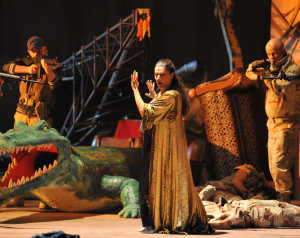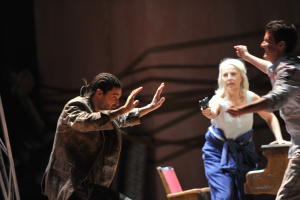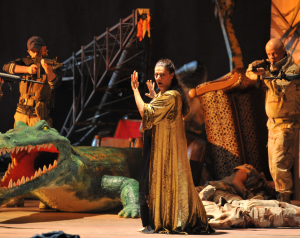
Photos by Hans Jörg Michel
How many angelic performances can fit on the head of a pin? When the opera is Handel’s Giulio Cesare in Egitto, and the Salzburg Festival cast includes mezzo-sopranos Cecilia Bartoli (Cleopatra) and Anne Sofie Von Otter (Cornelia), countertenor Andreas Scholl (Julius Caesar), and three other countertenors — Philippe Jaroussky (Sesto), Christophe Dumaux (Tolomeo), and Jochen Kowalski (the female role of Nirena) — there is no point in even trying to count.
Handel’s best-known opera, presented here in an uncut, three-act version that ran as long as Wagner’s Tristan und Isolde, has achieved popularity due to a staggering succession of supremely engaging melodies that perfectly capture the emotions of the protagonists. Anger, fury, heartbreak, despair, seduction, and love all find their perfect counterparts in arias that showcase singers’ abilities to tap into the core of the human experience. If the plot itself mangles history for quasi-romantic ends, its characters' plausibility and Handel's inspired music make for emotionally gripping theater.
La Bartoli
Much can be said of the production, which had its flaws, but the singers were the reason for the full house. Bartoli, 46, who has now taken on artistic direction of the Salzburg Whitsun Festival, remains at her peak. Not only is her coloratura flawless, and her voice as colorful and ravishingly beautiful as ever, but her ability to use her incomparable technique at the service of expression has also deepened with age.
As a seductress, Bartoli was irresistible. Teasing out her incomparably agile coloratura runs, she softened high notes to tickle the senses with a mixture of sweetness and delight. When, in the second act, she mounted a missile and diagonally ascended into the heavens, it felt as though she were riding the ultimate pink Cadillac off to her honeymoon rendezvous. And in her final aria, “Da tempeste il legno infranto” (When the ship, broken by storms), when she danced around the stage and adorned herself with strings of lights while flashing the trademark Bartoli smile, it was all one could do to resist running onstage and give her a huge hug.
Part of the love that Bartoli engenders is due to her ability to tap into suffering and pain. As she contemplated her death in Act 3’s “Piangerò la sorte mia,” she conveyed not only Cleopatra’s despair, but also her hope for ultimate revenge against her wicked brother, Tolomeo. The contrast between her plangent lows and ebullient highs, and her ability to effortlessly traverse the emotional distance between them, was yet another measure of her supreme artistry.
Brilliant Cast Strong From Top to Bottom

Scholl was also superb. His voice is lighter than Bartoli’s, save for his very occasionally employed booming top, and he is far better expressing the softer emotions than booming out martial pronouncements. If his Act 2 “Al lampo dell'armi” failed to challenge countertenor David Daniels’ supremacy in butch roles, his sublime, caressing legato left no question that his Caesar was the most tender and caring of lovers.
The amazing Jaroussky who, at age 34, still looks like a young boy, sings like a dream. With a voice stronger and sweeter than Scholl’s, he is capable of melting beauty and, if not exactly belligerence, an impressive show of strength. With coloratura technique on par with the best, he is a superb artist.
Stylishly thin Christophe Dumaux, who has sung Handel at the Glyndebourne Festival and the Metropolitan Opera, is another wonder. The most physically agile of the countertenor quartet, he placed his dexterity and unusually strong voice at the service of evil. His vocal tone, facial expression, and snake-in-the-grass movements contributed to another total portrayal.
Kowalski, the Wagner tenor turned countertenor who sang the role of Caesar 20 years ago, placed his diminished but still impressive resources at the service of Cleopatra’s servant, Nirena. Sufficient beauty and emotional mastery remain, and his performance was quite affecting. The same holds true of Von Otter. The voice is not as strong as before, but it retains all of its evenness and beauty. If anything, her ability to touch the heart, and to place her noble and dignified bearing at the service of music, has deepened. Twenty-nine years after her debut in an opera by Haydn, she remains a consummate artist.
I was quite taken by the brutish force and vocal beauty of baritone Ruben Drole (Achilla), but the audience seemed to favor the equally strong and colorful instrument of baritone Peter Kálmán (Roman tribune Curio). Neither is a coloratura wonder, but Kálmán did a fine job of masking his technical limitations. In his final aria, the ingenious doubling of a downward coloratura run with the orchestra’s sound of machine gun fire was especially effective.
Giovanni Antonini’s Baroque orchestra, Il Giardino Armonico, remains a master of colors and moods. Together they demonstrated how much of Handel's genius rests on his ability to choose instruments whose timbres enhance the characters' emotions.
Production Goes Awry
In the middle of Act 2, shortly after I scribbled, “this production is discreet in its modernity,” the blood began to flow. Lots of blood, and lots of brutality. The violence certainly lifted the veil off the baroque era’s romantic mythologizing of war, but it also bordered on the gratuitous. When Tolomeo unveiled a nude pin-up and simulated masturbation onstage, the couple in front of me left the theater. Moshe Leiser and Patrice Caurier’s production felt more and more like Peter Sellars by the time that the missiles had ceased flying, the soldiers had stopped twirling dead bodies, and the blood was replaced by the victors passing around a few joints.
Although the excesses of regietheater made the long evening a bit wearisome, they could not not diminish the impact of so much great music and singing. When the German / English supertitles flashed, “Let pure joy and pleasure again return to our hearts,” one could only smile and cheer in agreement.

